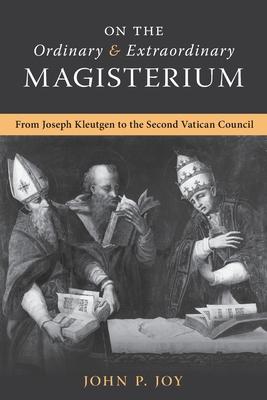This book, which is now in its second edition, expels the confusion surrounding the distinction between the ordinary and the extraordinary magisterium of the Church by exposing the ambiguity inherent in the term 'ordinary magisterium'. A detailed analysis of the origins of this terminology in the writings of Joseph Kleutgen, a nineteenth century neo-scholastic theologian, provides the historical and theological context for understanding its intended sense in the documents of Pope Pius IX and the First Vatican Council. The main lines of historical development are then traced from the end of the First Vatican Council up through the teaching of the Second Vatican Council with special attention given to the question of an ordinary magisterium of the pope and to the extension of the extraordinary magisterium to the secondary object of the magisterium and to the confirmation or re-affirmation of doctrines already infallibly taught by the Church. This latter question has serious implications for the interpretation of doctrinal declarations such as those found in Evangelium vitae, Ordinatio sacerdotalis, and several of the documents of Vatican II. The study concludes by considering the approach to these questions taken by the Second Vatican Council in the constitution on the Church Lumen gentium.

On the Ordinary and Extraordinary Magisterium: On the Ordinary and Extraordinary Magisterium from Joseph Kleutgen to the Second Vatican Council
This book, which is now in its second edition, expels the confusion surrounding the distinction between the ordinary and the extraordinary magisterium of the Church by exposing the ambiguity inherent in the term 'ordinary magisterium'. A detailed analysis of the origins of this terminology in the writings of Joseph Kleutgen, a nineteenth century neo-scholastic theologian, provides the historical and theological context for understanding its intended sense in the documents of Pope Pius IX and the First Vatican Council. The main lines of historical development are then traced from the end of the First Vatican Council up through the teaching of the Second Vatican Council with special attention given to the question of an ordinary magisterium of the pope and to the extension of the extraordinary magisterium to the secondary object of the magisterium and to the confirmation or re-affirmation of doctrines already infallibly taught by the Church. This latter question has serious implications for the interpretation of doctrinal declarations such as those found in Evangelium vitae, Ordinatio sacerdotalis, and several of the documents of Vatican II. The study concludes by considering the approach to these questions taken by the Second Vatican Council in the constitution on the Church Lumen gentium.